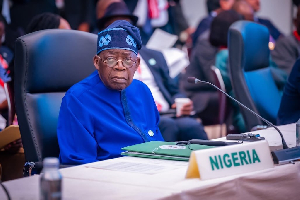Nigeria’s bid for a 2026 World Cup spot remains alive after their 4–0 win over Benin in Uyo, with Victor Osimhen’s hat-trick and Frank Onyeka’s late strike sealing a play-off place. In this writeup, PUNCH Sports will Analyse how the Super Eagles can punch their ticket to the North American global showpiece.
How Nigeria reached the play-offs
Benin began the final round of Group C fixtures at the top of the table, needing just a draw to confirm their passage. However, they were thoroughly outplayed in Uyo as Nigeria dominated from start to finish.
Nigeria’s automatic qualification hopes also depended on the outcome of the match between South Africa and Rwanda in Mbombela. The Super Eagles needed Bafana Bafana to drop points, but Hugo Broos’ men recorded a 3–0 victory to secure first place and a direct World Cup ticket.
The 4-0 win ensured that the Super Eagles leapfrogged the Cheetahs to finish second in the group. Although the result was not enough to secure automatic qualification, it positioned Nigeria among the four best runners-up on the continent, giving them another opportunity to reach the finals through the play-off route.
Under the current CAF qualifying format, only the nine group winners qualify automatically for next year’s World Cup in the United States, Mexico, and Canada. The four best runners-up advance to a separate play-off round to determine Africa’s representative in the inter-confederation play-offs.
How Eritrea ruling helped Nigeria reach the play-offs
A little-known regulation reshaped the outcome of the African qualifiers, when comparing second-placed teams, CAF deducted all points gained against the bottom side in each group. The rule was introduced to ensure fairness after Eritrea’s withdrawal left Group E with only five teams.
The adjustment dramatically altered the final standings. In Group A, Burkina Faso’s 21 points dropped to 15 after removing wins over Djibouti. DR Congo’s 22 points fell to 16 in Group B following deductions from matches against South Sudan.
Nigeria, second in Group C with 17 points, drew twice with Zimbabwe, meaning they lost only two points under the rule and finished with 15, which was enough to qualify as one of the best four runners-up thanks to superior goal difference.
Cameroon’s 19 points in Group D were reduced to 15 after excluding results against Eswatini, while Niger in Group E kept all 15 points since no team was removed from their five-nation group.
CAF play-off format explained
The CAF play-offs will feature four teams in Morocco, each drawn from the best-performing runners-up in the group phase. The matches will take place on neutral ground in Morocco between November 13 and 16.
According to CAF regulations, teams will be seeded based on the FIFA men’s world rankings of October 23. The highest-ranked team will face the lowest-ranked side, while the second and third teams meet in the other semi-final. Each fixture will be a single-leg knockout match.
If the score remains level after 90 minutes, 30 minutes of extra time will be played, with teams allowed a sixth substitution. Should the deadlock persist, a penalty shoot-out will decide the winner.
As it stands, based on projected rankings, Nigeria will face Gabon in the first semi-final, while Cameroon will meet DR Congo in the second. Both matches will be played on November 13, with the winners advancing to the final on 16 November. The victor of that final will earn Africa’s sole spot in the inter-confederation play-offs.
What happens after the CAF play-offs?
If Nigeria emerge victorious from the African play-offs, they will move on to the inter-confederation play-offs scheduled for March 2026. This stage serves as the last qualifying route for the World Cup and features six teams from five different confederations.
The participating nations will include one team each from CAF (Africa), AFC (Asia), CONMEBOL (South America), and OFC (Oceania), alongside two teams from CONCACAF (North and Central America and the Caribbean).
Bolivia will represent South America, New Caledonia will come from Oceania, and the Asian slot will go to either Iraq or the United Arab Emirates, while the two CONCACAF representatives will be confirmed in November.
The inter-confederation play-off structure
The FIFA Council, in 2017, approved the current play-off format. Each confederation, except UEFA, is allotted one play-off slot, while the host confederation receives an additional one, in this case, CONCACAF, as the 2026 tournament will be hosted by the United States, Mexico, and Canada.
The play-offs will take place in Mexico, serving as a preparatory event for the World Cup. The matches will be staged at Estadio Akron in Guadalajara and Estadio BBVA in Monterrey between March 23 and 31, 2026.
The six teams will be seeded based on the FIFA men’s world rankings. The two highest-ranked sides will receive automatic byes to the final round, while the remaining four teams will contest two semi-final fixtures.
The winners of those semi-finals will then face the two seeded teams in separate finals. The winners of those two finals will claim the last two tickets to the 2026 World Cup.
In simpler terms, if Nigeria advance to this stage, they are expected to be seeded, which means they would bypass the semi-final and play only one decisive final match to secure their place at the World Cup.
As with the CAF play-offs, matches in this phase will be decided over a single leg. Extra time and penalties will be used if necessary.
The road ahead for Nigeria
The Super Eagles’ journey to the World Cup has become considerably longer, but the team’s emphatic win over Benin showed a renewed sense of belief and urgency. Head coach Eric Chelle’s tactical choices, including making four changes to the team that played Lesotho four days earlier, paid off handsomely.
With hopes of either getting an automatic ticket or missing out as they did for Qatar 2022, the NFF had already scheduled two friendly matches in the United States as part of preparations for the 2025 Africa Cup of Nations, against Venezuela in Houston on November 14 and Colombia in New York four days later. However, both fixtures will now have to be cancelled to accommodate the World Cup play-offs.
With Gabon being their next opponents, Nigeria will need to maintain that momentum and composure in the play-offs. Success in Morocco would bring them one step closer to redemption and to a seventh appearance on football’s biggest stage.
The road may be winding, but for the Super Eagles, the mission remains clear: survive the play-offs, soar past the inter-confederation hurdle, and grab a ticket to North America 2026.
Sports News of Thursday, 16 October 2025
Source: www.punchng.com













